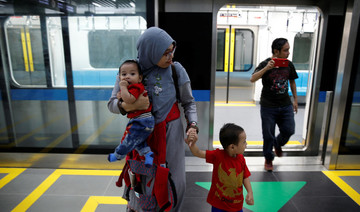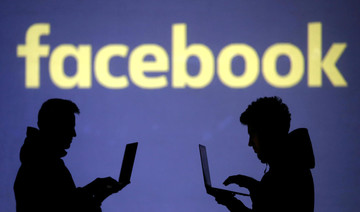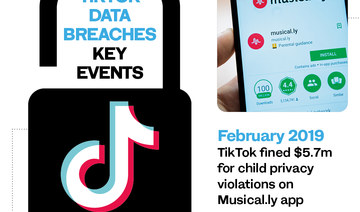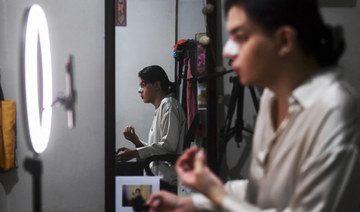JAKARTA: Almost every day, “Janda,” a self-described Indonesian housewife with 2,000 Twitter followers, dispenses lifestyle tips, complains about city life, and praises how the government of President Joko Widodo has improved her life as a young mother.
But Janda the housewife does not exist. The Twitter account’s real owner is an unmarried middle-aged man who offers political social media services backing Widodo’s re-election campaign.
He is a leader of one of the many so called “buzzer” teams, named for the social media buzz such groups aim to create, that have sprung up in Indonesia ahead of the presidential election next month in the world’s third-largest democracy.
“Our battleground is social media. The content we are making for the election is reaching at least a million people per week,” said the owner of the Janda account, declining to be named because his work is legally in a gray area.
In interviews with Reuters, over a dozen buzzer team members, social media consultants and cyber experts described an array of social media operations that they said were spreading propaganda on behalf of both Widodo and his challenger, retired general Prabowo Subianto.
Widodo enjoys a comfortable lead in most opinion polls over Prabowo, as the challenger is widely known. The two contested the previous election in 2014 as well, and Widodo won narrowly.
Fake news was spread in that election as well, although social media was less far-reaching than it is now.
Under Indonesia’s broad Internet defamation law, creating and spreading fake news is illegal, but holding social media accounts in false names is not, unless a real person is being impersonated. Social media companies however mostly bar holding accounts under false names.
Three buzzers directly involved in the current campaign described how they operate hundreds of personalized social media accounts each on behalf of the candidates. One denied propagating fake news, while two said they didn’t care about the accuracy of the content.
Both campaign teams deny using buzzers or spreading fake news.
Ross Tapsell, an expert on politics and media at Australia National University, said that it has become normal for candiates in Southeast Asia to hire online campaign strategists, who in turn tap an army of people to spread content on social media.
“So there is no direct link at all to the candidate,” he said.
The buzzer campaigns have far outstripped the efforts of Facebook and other social media companies to curtail creation of fake accounts and spread fake news, cyber experts say. Reuters found that while robot accounts were occasionally deleted, personalized fake accounts like “Janda” are widespread on Twitter and Facebook platforms, despite violating the companies’ rules.
On the edge
Misinformation spread by real accounts — which are often coopted by buzzer teams — is rampant on Facebook as well as on its Instagram and WhatsApp affiliates and rival service Twitter. The companies say they are working with the government and fighting back against false content.
Representatives for Twitter, Facebook and Whatsapp told Reuters they regularly delete fake accounts in Indonesia, but declined to share removal numbers.
A Twitter spokeswoman told Reuters it is working to remove networks of accounts engaged in misinformation and disinformation.
Facebook, which counts Indonesia as its third-largest market globally with an estimated 130 million accounts, says it trains election management bodies how to flag fake news to the company, which is then evaluated by moderators and deleted if it breaks its community standards.
For Indonesian Communications Minister Rudiantara, those efforts are not enough.
He said the government had asked social media companies to work with authorities to create a standard operating procedure that would allow fake news and hoaxes to be flagged and resolved. They have yet to comply.
“We expect it to get much worse as we get closer to the election,” said Harry Sufehmi, co-founder of Mafindo, an Indonesian organization fighting fake news, which listed nearly 500 social media hoaxes related to politics in 2018.
He was one of three experts whose research found that a larger proportion of the misinformation targets Widodo, with some posts depicting him as anti-Islam, a Chinese stooge or a communist.
All are inflammatory accusations in a country that has the world’s largest number of Muslims, where the communist party is banned and suspicions linger over the influence of Beijing.
A smaller portion of the misinformation campaigns target Prabowo.
Buzzing for money
On a recent afternoon in Jakarta, one buzzer team leader scrolled through two mobile phones that had over 250 Facebook , Instagram, Whatsapp, Youtube and Twitter accounts, each with a fake persona. He updated five of them with posts praising Widodo’s achievements or mocking Prabowo and his running mate.
He denied disseminating misinformation, focusing instead on content that gushed about his clients’s virtues. But he admitted he does look for dirt on opponents as part of a “complete package” of posts and videos that he sells for 200 million rupiah ($14,000) a month.
His staff of 15, whom he refers to as “cyber troops,” in turn have subcontractors, throughout Indonesia, many of whom are unaware of the ultimate identity of clients, he said.
He told Reuters he was hired by an adviser to Widodo’s campaign.
Ace Hasan Syadzily, a spokesman for the president’s campaign team, denied knowledge of such groups, but said “the campaign had an obligation to counter false or negative narratives” against Widodo.
Another buzzer said he had been hired by advisers to Prabowo, while the third said he supplied services to a social media agency used by both campaigns.
Anthony Leong, the Prabowo digital team’s coordinator, denied they use buzzer teams, noting that the campaign required its “10,000 digital volunteers” to use real names and only allowed them to post “positive content.”
“Work is fun“
According to the buzzers interviewed, a junior “cyber soldier” can be paid between 1 million to 50 million rupiah per project depending on the reach of his social media accounts.
“For a lot of us, the work is fun...and the salaries are decent,” said the buzzer who said he is a contractor for a social media agency used by both the Widodo and Prabowo campaigns.
He said his role was to create trending topics during key election moments, using hashtags and content provided by his agency in combination with his personal fake accounts, he said.
“For me, there’s no hoax or so-called negative content. The material just comes from the client,” he told Reuters.
Pradipa Rasidi, a researcher at the University of Indonesia, said most buzzers are young graduates who do it “because it’s hard to find a job after university and the pay is higher.”
But the legal risks are real. The buzzer activities are punishable by jail if they are judged to breach Indonesia’s Internet defamation law.
All three buzzers interviewed by Reuters declined to be named or provide certain details of their operations because of those risks.
Policing by the social media companies, however, was not a concern: None had ever had an account or post deleted.
In Indonesia, Facebook and Twitter are ‘buzzer’ battlegrounds as elections loom
In Indonesia, Facebook and Twitter are ‘buzzer’ battlegrounds as elections loom
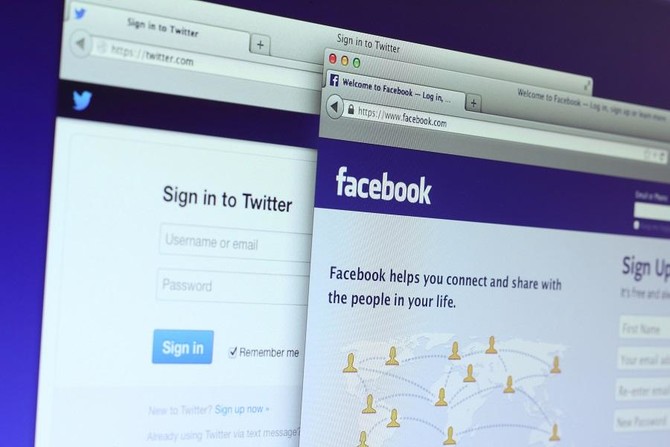
- ‘Buzzer’ teams, named for the social media buzz such groups aim to create, have sprung up in Indonesia ahead of the presidential election
- Three buzzers directly involved in the current campaign described how they operate hundreds of personalized social media accounts each on behalf of the candidates
Saudi Vision 2030 changed everything, says CEO of Publicis Communications KSA

- Adel Baraja brought over 2 decades of global experience
- Role includes overseeing the group’s Saudi operations, fostering talent
DUBAI: Advertising and marketing network Publicis Groupe appointed Adel Baraja as CEO of Publicis Communications Saudi Arabia in late February as part of its efforts to strengthen its presence in the Kingdom.
Publicis Communications is the creative communications arm of the network housing agencies such as Leo Burnett and Saatchi & Saatchi.
The appointment reinforced Publicis Groupe Middle East’s commitment to accelerating growth within Saudi Arabia while enhancing collaboration and expanding capabilities to deliver transformative work for clients.
Baraja brought with him 22 years of global advertising and brand-building experience.
He had started his professional life in engineering before realizing it was not for him.
He told Arab News: “I wanted to be with clients and that’s when I took my first pivot toward client management (and) sales, and I found my calling in marketing.”
He spent his early days working across advertising agencies in Germany, Spain, and Portugal, before returning to Saudi Arabia where he first interacted with Publicis Groupe. At the time he was hoping to find a job at Leo Burnett, but turned out to be a better fit for one of its clients, Saudi Telecom Company.
He then took a break from advertising agencies to work across industries in companies like Dow Chemical and Volkswagen.
And then, he said, came a “critical moment” in his career.
He added: “I never considered (working in) government before, but six months prior Vision 2030 was introduced, and that was everything.
“It was a meticulous plan — a road map towards something that I had never experienced or seen before. So, I got my first role in government in 2017.”
He led the newly established promotion and nation-branding sector at the Saudi Export Development Authority, growing the Saudi Made portfolio of companies from 20 to more than 2,000 companies during his tenure.
He also held the position of deputy minister of investment promotion at the Ministry of Investment before joining Publicis Groupe Middle East.
Communications had always been a “savvy topic” in the Kingdom, but it was heavily focused on and driven by the private sector, he said.
Vision 2030 changed it all, and “the government sector became a big spender in the communication sector and a driver to creativity,” he added.
With these changes, the demand for local talent is higher now than ever before, and fostering that talent is a strong priority for Baraja and Publicis Groupe.
Baraja is tasked with overseeing the integrated growth strategy of Publicis Communications in his new role, as well as working with educational institutions to empower Saudi youth for careers in advertising, media, and digital marketing.
He said that Bassel Kakish, CEO at Publicis Groupe Middle East and Turkiye, told him that the company needs to be developing and fostering local talent, hiring more locally, and ensuring gender equality, training more women in the advertising and creative industries.
Baraja said: “We are competing against other industries to get that share of talent, so we need to promote our industry and our company.”
Looking ahead, the company is investing in the future, which means increased focus on technology through acquisitions such as that of tech company Epsilon in 2020 and e-commerce company Corra in 2023.
Publicis last year announced the acquisition of a full stake in Publicis Sapient AI Labs, an artificial intelligence research and development joint venture launched in 2020 which aims to strengthen Publicis Sapient’s data and AI capabilities.
Baraja added: “That kind of investment shows the focus toward the future and the transformation of the business.”
There is a lot of discussion around AI replacing marketing and agencies, he said, but he believes: “We are well equipped to address this challenge and to prove that we can deliver even better communications, and better and well-designed campaigns and media performances.”
TikTok CEO to fight US ban law
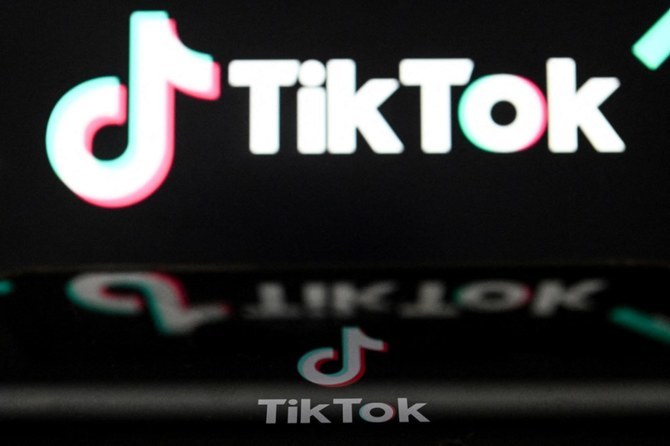
WASHINGTON: TikTok’s chief executive said on Wednesday that the company expects to win a legal challenge to block legislation signed into law by US President Joe Biden that he said would ban the popular short video app used by 170 million Americans.
“Rest assured — we aren’t going anywhere,” CEO Shou Zi Chew said in a video posted moments after Biden signed the bill that gives China-based ByteDance 270 days to divest TikTok’s US assets or face a ban. “The facts and the Constitution are on our side and we expect to prevail again.”
Biden’s signing sets a Jan. 19 deadline for a sale — one day before his term is set to expire — but he could extend the deadline by three months if he determines ByteDance is making progress. Biden is seeking a second term against former President Donald Trump.
In 2020, Trump was blocked by the courts in his bid to ban TikTok and Chinese-owned WeChat, a unit of Tencent, in the United States.
Chew added: “Make no mistake — this is a ban on TikTok.” He emphasized that TikTok would continue to operate as the company challenges the restrictions.
Driven by widespread worries among US lawmakers that China could access Americans’ data or surveil them with the app, the bill was overwhelmingly passed late on Tuesday by the US Senate. The US House of Representatives approved it on Saturday.
The four-year battle over TikTok is a significant front in a war over the internet and technology between Washington and Beijing. Last week, Apple said China had ordered it to remove Meta Platforms’ WhatsApp and Threads from its App Store in China over Chinese national security concerns.
TikTok is set to challenge the bill on First Amendment grounds and TikTok users are also expected to again take legal action. A US judge in Montana in November blocked a state ban on TikTok, citing free-speech grounds.
The American Civil Liberties Union said banning or requiring divestiture of TikTok would “set an alarming global precedent for excessive government control over social media platforms.”
However, the new legislation is likely to give the Biden administration a stronger legal footing to ban TikTok if ByteDance fails to divest the app, experts say.
If ByteDance failed to divest TikTok, app stores operated by Apple, Alphabet’s Google and others could not legally offer TikTok or provide web hosting services to ByteDance-controlled applications or TikTok’s website.
The bill would also give the White House new tools to ban or force the sale of other foreign-owned apps it deems to be security threats.
Democratic Senator Ron Wyden said he was concerned the bill “provides broad authority that could be abused by a future administration to violate Americans’ First Amendment rights.”
Republican presidential candidate Donald Trump said on Monday that President Joe Biden was “pushing” for a ban on TikTok and would be the one responsible if a ban were imposed, urging voters to take notice.
Biden’s re-election campaign plans to continue using TikTok, a campaign official said on Wednesday. Trump’s campaign has not joined TikTok.
Biden signed legislation in late 2022 that barred US government employees from using TikTok on government phones.
Advertising network MCN launches influencer practice in Mideast

DUBAI: Regional advertising group Middle East Communications Network has launched a dedicated influencer practice in the Middle East, North Africa and Turkiye to help clients across the group’s agencies, including FP7McCann, MullenLowe, UM, and Weber Shandwick.
Rami Gholmieh has been appointed to lead the practice as the regional director of influencer marketing, while Razan Zahra will serve as director of influencer relations.
“At the heart of our influence practice lies a commitment to two fundamental principles: effectiveness and efficiency,” Gholmieh told Arab News.
“The challenge lies in creating balance between leveraging channels to encourage content sharing and investing into paid promotions. Ultimately it requires a nuanced approach, tailored to the specific objectives and audience dynamics of respective brands.”
The practice takes a “de-siloed” approach to help agency brands across the group deliver influencer marketing campaigns, according to MCN.

The influencer marketing industry is rapidly growing, with 76.9 percent of marketers saying influencer marketing is a top priority, and 46.2 percent increasing budgets last year, according to a 2023 survey.
The growth and evolution of the industry is partly the reason why MCN chose to launch a dedicated practice now despite influencer marketing having been around for years.
With “the evolving dynamics of consumer engagement and brand interactions combined with new platforms and changing consumption patterns, a dedicated and fully integrated practice within the broader ecosystem is required to create tailor-made solutions for our clients,” the company said.
As the digital and social media landscape becomes more complex, MCN’s influencer practice aims to help brands by “understanding the social voice, (acquiring) knowledge of real-time cultural insights, (and) possessing platform expertise, the ability to co-create, and journey awareness,” concluded Gholmieh.
Eurovision Song Contest host Sweden braces for anti-Israel protests

- Event organizer European Broadcasting Union has resisted calls for Israel to be excluded due to its war in Gaza
- Contest will take place in Malmo from 7-11 May and is expected to draw 100,000 visitors
MALMO: Sweden said it plans to host a dazzling Eurovision Song Contest, watched by 200 million people worldwide, but visitors face heightened security amid planned protests over Israel’s participation and a new geo-political backdrop since Sweden joined NATO.
The contest, the world’s biggest of its kind, takes place in Malmo from 7-11 May and is expected to draw 100,000 visitors to Sweden’s third-largest city which has a large Muslim population. Organizers plan a special tribute to Swedish pop group ABBA, who won Eurovision 50 years ago this year. The European Broadcasting Union (EBU), which organizes the contest, has resisted calls for Israel to be excluded due to its war in Gaza. Controversy over the conflict has already hit various cultural events across Europe. Much focus is expected to be on Israeli contestant Eden Golan and her song Hurricane, as multiple large pro-Palestinian protests are planned outside the venue in Malmo. Israel was permitted to compete after it agreed to modify the lyrics of its original song “October Rain” which the EBU said made reference to the Oct. 7 Hamas onslaught in Israel.
EBU brands Eurovision a non-political event and insists that the contest is between public service broadcasters, not governments.
Still, it banned Russian in 2022 from Eurovision after several European public broadcasters called for the country to be expelled following its invasion of Ukraine.
Sweden is hosting the annual competition for the seventh time, after Swedish singer Loreen won last year’s competition in Liverpool with her song “Tattoo.”
Ebba Adielsson, executive Eurovision producer from Swedish broadcaster SVT, promised “some smashing shows.” She ruled out an ABBA reunion but said the event would celebrate the group’s 1974 win with their song “Waterloo,” a victory that launched the band onto the international stage.
Swiss contestant Nemo is the favorite to win this year, according to bookmakers, followed by Croatia’s Baby Lasagna, Joost Klein of the Netherlands, and Italy’s Angelina Mango.
’HIGH THREAT-LEVEL’
Visitors from 89 countries expected in Malmo will have to pass through airport-like security checks when entering venues around the city.
“There’s a high threat level combined with a lot of people,” said Per-Erik Ebbestahl, Malmo’s security director.
Organizers face the risk of protests escalating into violence, heightened terror threats in the country, and increased tensions with Russia after Sweden’s NATO membership.
In central Malmo there are official posters for Eurovision but also protest banners replicating the same colorful design, with the word Eurovision replaced by ‘genocide’ and the words: “Israel out of Eurovision or Eurovision out of Malmo.”
Orwa Kadoura, a Palestinian living in Malmo and one of the organizers of the protests, said the Israeli delegation was “here to represent Israel and their government, which is committing acts of genocide right now.”
Israel rejects any accusation of genocide in Gaza during its war against Hamas.
Police say security will be tighter compared with when Sweden last hosted the event in 2016.
“The situation around the world is complex, and also the security for Sweden is different,” said Petra Stenkula, Malmo police chief. “We are ready for anything that can happen.”
Sweden joined NATO in March, two years after Russia’s invasion of Ukraine forced it to rethink its national security policy. Russia has threatened to take unspecified “political and military-technical counter-measures” in response.
Gang crime in Sweden’s biggest cities, including Malmo, has also been a problem for years, fueled by the drug trade.
Eurovision begins on May 7 with the first semifinal, followed by a second semifinal two days later and the final on Sat. May 11.
Sky News report reveals Israel’s involvement in mass grave in Gaza
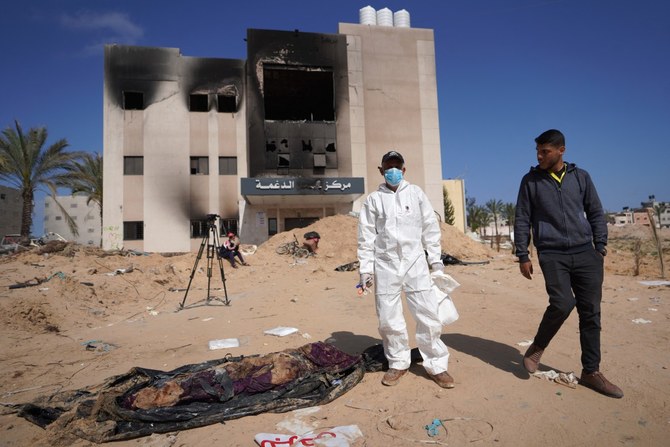
- Evidence suggests IDF bulldozed graves after taking control
LONDON: An investigation by Sky News suggests Israel is likely responsible for the mass grave discovered at a hospital in Gaza’s southern city of Khan Younis over the weekend.
Local authorities reported uncovering 283 bodies in the mass grave within the courtyard of Nasser Hospital after the Israel Defense Forces withdrew from the area on April 7.
Israel’s military dismissed claims of burying bodies there as “baseless” but confirmed that it had “examined” some bodies during a two-week operation at the hospital.
Analysis of satellite imagery and social media indicates that Palestinians buried their dead in mass graves during Israel’s siege of Nasser Hospital and that the IDF bulldozed these graves after taking control.
Prior to the Israeli army’s takeover of the hospital compound in its full-scale operation in February, staff had been forced to bury hundreds of bodies in makeshift graves near the hospital’s main building due to the impossibility of reaching nearby cemeteries.
The IDF began exhuming and examining bodies buried in the compound based on intelligence sources indicating the presence of bodies belonging to Israeli hostages.
The army said the examination “was carried out respectfully while maintaining the dignity of the deceased.
“Bodies examined, which did not belong to Israeli hostages, were returned to their place,” the IDF added.
However, Sky News’ Data and Forensic team discovered evidence indicating extensive damage to the sites caused by the army’s examination.
Footage uploaded a few days after the IDF left Nasser Hospital showed significant destruction at the southeastern corner of the complex, where some of the mass graves had been dug.
Another video revealed that bulldozer operations in the area caused an arm to be visible, partially buried in a mound of earth.
Satellite images confirmed that the damage occurred while Israeli forces were occupying the complex between Feb. 15 and 22.
The UN’s human rights chief expressed horror at the discovery and announced an investigation into claims that some of the bodies had their hands bound and were stripped of clothing.
Earlier last week, other mass graves were found at Al-Shifa, the largest medical facility in the coastal enclave.
The discovery led the Hamas-run government to accuse Israel of digging the graves “to hide its crimes.”
Since the conflict began, with retaliatory acts toward Hamas fighters killing and kidnapping 1,200 Israelis, Tel Aviv has launched a bloody, full-scale operation into the Gaza Strip that has resulted in the deaths of over 34,000 people, mostly women and children.


